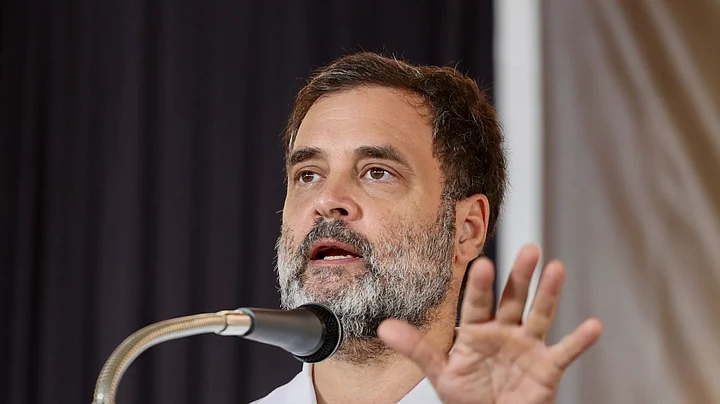A few months ahead of the Lok Sabha elections, India’s political opposition — the INDIA bloc — appeared battered, bruised, and ready to implode, lacking a clear, cohesive national-level strategy to counter the Bharatiya Janata Party (BJP).
Mixed manifesto announcements were being made one after the other to seduce different vulnerable groups in the electorate, while there seemed no clear national leader or voice to take on Narendra Modi, who made this election all about 'Brand Modi'.
But, as the verdict showed, the INDIA bloc, i.e., the Congress party plus its allies, against all of the odds, won an impressive 234 seats.
While the Congress party did well to improve upon its 2019 performance significantly (in terms of seats won), the Trinamool Congress in West Bengal and the Samajwadi Party in Uttar Pradesh had a better strike rate (than the Congress 30 percent) against the BJP with strike rates of 69 percent and 59 percent scored respectively.
Sharad Pawar’s Nationalist Congress Party in Maharashtra won eight out of the 10 seats it contested (strike rate of 80 percent vs BJP), while the Dravida Munnetra Kazhagam won all the 22 seats, a 100 percent strike rate against the BJP (even though in terms of vote share, the BJP did well in the south).
This reflects a regionally-led national outburst of an angry vote against the BJP, where the average Indian voter consciously humbled Modi and Amit Shah’s political duopoly over the last decade. Rivers of ink have been spilt in the past few days over what could have gone wrong for the BJP (including a more reflective analysis of the results done here).
What needs to perhaps be now understood and emphasised is how the INDIA bloc and the Opposition need to take this shot in the arm and use it to their advantage to restore balance and faith in India’s democratic future.
The Opposition needs to work strongly towards providing India’s silenced agency — civil society institutions along with the judiciary — a renewed voice, allowing them to keep centralising powers (including some of their own) in check, powers that have attempted to choke democratic dissent and a free-voice against unjust laws.
This may mean more democratic protests and people-led movements soon, which is fine, but playing the waiting game for too long, in the hope of taking "appropriate steps at an appropriate time" (as stated by Congress party President Mallikarjun Kharge) without a clear strategy allow the BJP to gain lost ground.
The next three upcoming assembly elections hold the key. Maharashtra, Jharkhand, and Haryana, where the BJP has been on the back foot, present a clear advantage for regional parties (in the Opposition) to do well and present a unified challenge against the Modi government on local issues.
Price rise, unemployment, high access inequality, low economic opportunities, and the lack of an upward-mobility-centred welfare vision, are all issues that have disillusioned the youth, the lesser privileged, the marginalised, and the socially precarious groups. But the Opposition, while having benefitted from this anger, hasn’t done much to offer a robust ideological push against the BJP.
This is where the next two years are critical. Despite the 2024 election results, the INDIA bloc was late in channelling its efforts and coming together to finalise a common agenda for the elections. Their fight for 2029 needs to start from now. A common welfare vision that thrusts its weight on a socially and economically inclusive reform agenda is crucial in this regard.
The Congress manifesto had good ideas as electoral promises offered (like the Right to Apprenticeship) but their presentation (from an electoral standing) and ground-level pitch needed work. It can perhaps push for these ideas to find greater absorption now, with the support and weight of other regional parties and through Parliament. It can also pressure the BJP to adopt some of these ideas in its governance model. For the people, in a democratic republic, that’s a win-win. -
The other question in front of the INDIA bloc-centred Opposition is whether some of these alliances will stand the test of time as we approach assembly elections in multiple states. The AAP has ruled out any pre-poll alliance with the Congress party in the 2025 Delhi elections. Mamata Banerjee’s TMC has a similar perspective on not associating with the Congress party in Bengal.
In UP, the Congress party worked closely with the SP in 2024 and did well in its seat wins (compared to its dismal 2019 performance). Both parties benefited from the alliance, however, whether this will go on till the assembly polls in UP, remains unclear. Furthermore, there is uncertainty in terms of regional alliances spread across states like Maharashtra.
There is also a leadership crisis for the Opposition. Rahul Gandhi’s own prospects as a national-level leader, who can take the BJP head-on, may have gotten a boost with his yatras and the election results, can his own candidature as a parliamentarian present a national, reformative voice to take on Modi and the BJP while keeping the Opposition united?
As a result, while electorally, a stronger and better-populated Opposition bench in the Lower House has its advantages in tackling the bulldozer Raj of Modi-Shah while protecting the sacred fundamentals of the Indian Constitution, to take this symbolic ‘victory’ forward, an anischit kaal lies ahead.
(Deepanshu Mohan is Professor of Economics, Dean, IDEAS, Office of Inter-Disciplinary Studies, and Director, Centre for New Economics Studies (CNES), OP Jindal Global University. He is a Visiting Professor at the London School of Economics, and a 2024 Fall Academic Visitor to the Faculty of Asian and Middle Eastern Studies, University of Oxford. This is an opinion piece and the views expressed above are the author’s own. The Quint neither endorses, nor is responsible for them.)
(At The Quint, we question everything. Play an active role in shaping our journalism by becoming a member today.)
